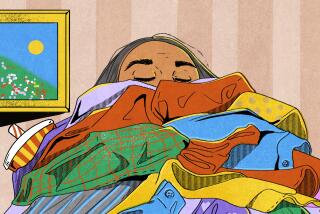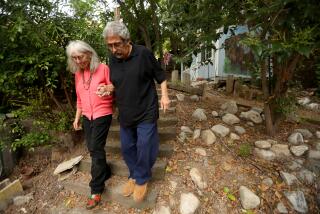Not answers, but insight
- Share via
I flew down south to Montgomery on a mission to download from my elderly aunts decades of family history.
I packed my suitcase with the tools I thought I’d need: a dress for church, a tape recorder, and a pair of hiking shoes for the trek to our family’s backwoods cemetery.
And I was ready to roll up my sleeves. I wanted to take them shopping, do their yardwork or whatever they could cram into three days with me.
But what they wanted slowed me down and taught me something new about family.
::
I visited the aunties on a whim, prodded by my sisters in Ohio. We had so many questions that needed answers; things we never got a chance to ask our mother -- our aunts’ oldest sister -- before she died 35 years ago.
Now Aunt Rose, 82, and Aunt Lottie, 77, are the only two of the seven Daniel siblings left. They live side by side in a tiny duplex and spend every morning and evening together.
I intended to gently interrogate them, aiming to separate family lore from fact, learn the makings of their Southern recipes and finally cobble together a genealogical record. Before it’s too late was the unspoken catalyst.
But I discovered that too much time had already passed.
Aunt Rose’s memory is so riddled with gaps, I sometimes had to remind her whose daughter I am. And while we spent hours sorting through old photographs, it was my job to name and catalog them.
Aunt Lottie had always greeted guests with home-cooked feasts, but dinner on our first night was a sack of store-bought fried chicken. And she wanted to hear about my life in Los Angeles, not talk about her life on the family farm.
We slept in instead of going to church. Our big outing was dinner at Olive Garden. And after fumbling once with my tape recorder, I put it away and never brought it back out.
Instead, I went on long neighborhood strolls with Aunt Rose, who can’t recall anymore how to use a stove, but remembers the joy of teaching second-graders 50 years ago in the first mixed-race classes at their country school in Alabama.
And before I left, I framed an 8-by-10 picture we discovered in a dusty box of old photographs. It was a young Rose, and she couldn’t stop staring at it. The smile was radiant, the face unlined, the long hair glossy and elegantly styled. After I left, a neighbor mounted it for her on the wall.
Aunt Lottie never got around to showing me how to make the macaroni and cheese I love. But we talked at the kitchen table until our throats were sore, then sprawled for hours on the couch, trading gossip and watching “Dancing With the Stars.”
And I logged her on to her new computer so that we could visit far-flung relatives through their Facebook pages. She saw pictures of her grandson’s girlfriend, her niece’s high school graduation and her daughter-in-law’s surprise birthday party.
It wasn’t rides around town or moving boxes, but the quiet sharing that they wanted.
::
I’ve written before about older women I’ve admired here -- honorary aunts, I consider them -- bouncing toward life’s inevitable end.
Aunt Tiny went on an African safari at 94 and sweated through exercise classes until she turned 100. Aunt Flo took up tap dancing in her 70s and was fending off suitors into her 80s.
But looking at them, I could never see myself. Just thinking about their exploits left me exhausted.
In my family, getting old is not so energetic or so attractive. My aunts’ medication bottles are spilling out of their Tupperware containers and the highlight of their social season is this weekend’s prayer group retreat.
But they have made peace with their failing bodies and fading memories, and I’ll get over what that loss means to me.
I went to Alabama armed with an agenda: a baby boomer’s need to know my medical legacy and connect the dots of family history. In that sense, my mission failed.
But my visit taught me that I already know most of what I need.
I could look around their homes -- crowded with friends and cluttered with keepsakes -- and see the links to family traits that define me. Their incurable messiness, their boundless generosity . . . that transcend the details of our history.
And the stories I never knew about my mother -- that she taught school for a while before heading North alone, that every week she wrote long letters home -- all of it resonates in my own journalist’s bones.
I left Montgomery without tape recordings or a completed family tree, but with a sense of who I am and who I come from.
What I needed wasn’t information, after all, but the feeling that I belong.
--
More to Read
Sign up for Essential California
The most important California stories and recommendations in your inbox every morning.
You may occasionally receive promotional content from the Los Angeles Times.













